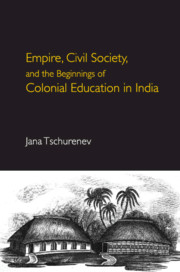Book contents
- Frontmatter
- Dedication
- Contents
- List of Figures
- List of Tables
- List of Abbreviations
- Acknowledgements
- Introduction: Empire Civil Society, and Educational Transformation in India
- 1 A Colonial Experiment in Education, Madras, 1789–1796
- 2 Education of the Poor, 1805–1813
- 3 Missionaries, Empire, and the Cause of Universal Education, 1792–1824
- 4 Race, Class, and Gender: The Social Agenda of Education, 1809–1830
- 5 Rules and Numbers: Transforming Rural Education, 1814–1830
- 6 Intellectual Conquest: Education Societies, ‘Useful Knowledge’, and the Bengal Renaissance, 1817–1854
- 7 Civil Society, Government, and Educational Institution-Building, Bombay Presidency, 1819–1882
- 8 Teaching the Marginalized: Universal Education and the Politics of Inequality, 1789–1937
- Conclusion: The Emergence of Public Elementary Schooling in an Imperial Frame
- Bibliography
- Index
8 - Teaching the Marginalized: Universal Education and the Politics of Inequality, 1789–1937
Published online by Cambridge University Press: 26 April 2019
- Frontmatter
- Dedication
- Contents
- List of Figures
- List of Tables
- List of Abbreviations
- Acknowledgements
- Introduction: Empire Civil Society, and Educational Transformation in India
- 1 A Colonial Experiment in Education, Madras, 1789–1796
- 2 Education of the Poor, 1805–1813
- 3 Missionaries, Empire, and the Cause of Universal Education, 1792–1824
- 4 Race, Class, and Gender: The Social Agenda of Education, 1809–1830
- 5 Rules and Numbers: Transforming Rural Education, 1814–1830
- 6 Intellectual Conquest: Education Societies, ‘Useful Knowledge’, and the Bengal Renaissance, 1817–1854
- 7 Civil Society, Government, and Educational Institution-Building, Bombay Presidency, 1819–1882
- 8 Teaching the Marginalized: Universal Education and the Politics of Inequality, 1789–1937
- Conclusion: The Emergence of Public Elementary Schooling in an Imperial Frame
- Bibliography
- Index
Summary
It is plain then that there is no longer hope for our country. Our religion and all pertaining to it, is gone. The daily ceremonies are observed no longer. Impiety triumphs. Where once thousands learned to recite the Vedas, now nothing is thought of but learning English. The feasts of the Bráhmans are ended, and the English feast in their places. And all these evils are rapidly increasing; henceforth there is no hope for the country. All is destined to ruin.
Some noble souls have started schools for mahars and mangs, and such schools are supported by the merciful British government. Oh, the mahars and mangs, you are poor and sick. Only the medicine of knowledge will cure and heal you.
Two testimonies from the early 1850s came to dramatically different evaluations of the social impact of colonial education. Both were published in the Anglo- Marathi Dnyanodaya, or ‘Rise of Knowledge’, issued by the American missionaries in Bombay. They show that the confrontation between colonial hegemonic ambitions, and the norms of ‘brahminical patriarchy’ affected different social groups in radically different ways. The first quote is part of ‘an old orthodox Hindu['s]’ lament about the decline of Vedic learning and its replacement by English education. It expresses an experience of loss of a learning and religious culture. The second quote represents a genre which could not be more different. It is taken from an essay on the suffering of the Mangs and Mahars, the Untouchables, under the pre-colonial Peshwa rule in western India. The author of this essay, Muktabai, studied in one of the schools for untouchable students, which were established by Jotirao and Savitribai Phule and managed by the Society for Promoting the Education of Mahar-Mangs (SPEMM, 1852). She was herself a Mang, and 14 years old, when she wrote the essay, which is considered one of the earliest modern public expressions of a Dalit woman. Muktabai's text illustrates the perspective of the anti-caste movement. Colonial rule had disrupted the old social order, which opened new opportunities for the lowest castes. Schools for them were even supported by the state. Through learning and the acquisition of rational knowledge, the Untouchables could transform themselves and pursue their social emancipation.
- Type
- Chapter
- Information
- Publisher: Cambridge University PressPrint publication year: 2019



